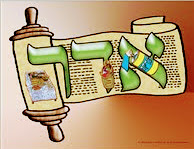- Main Page
- Torah Readings
- Holiday & Monthly commentary from Min. Garrett
- Weekly drash from Jonathan
- Weekly parashah commentary from Min. Garrett
- Contact Us
- Membership
- Mission and Vision Statements
- Statements of Belief
- Books
- Articles by Min. Garrett
- Other Ministries
- Music Links
- Morning Prayers
- CAP/USAF News
- Jewish Calendar and Jewish History
Skip to content
Posts in Category: First Fruits of Zion
Pinchas
On July 3, 2021 0 Comments
- First Fruits of Zion
TORAH PORTION for Shabbat: July 3, 2021
-
- Pinchas (פנחס | Phinehas)
- Torah: Numbers 25:10-30:1 *
- Haftarah: 1 Kings 18:46-19:21
- Gospel: John 2:13-22
* Christian Bible reference varies.
Sacrifices for the Appointed Times
God’s holy place is called the Tent of Appointment. His holy times are called the appointed times. The reason is to teach you that the Sabbath and the holy days are like tabernacles pitched in the flow of time. When we enter the appointed times, we enter a holy temple made of time.
In the days of the Temple and Tabernacle, the appointed times were celebrated with special additional sacrifices. They are called additional sacrifices because they are brought in addition to the two lambs that were offered every day as a continual burnt offering. Numbers 28-29 contains a version of the biblical calendar that contains specific details for the festival sacrifices. The appointed times in Numbers 28-29 establish regular daily, weekly, monthly, and annual cycles and rhythms. They begin with the daily times of sacrifice, two appointed times every day. Then there is the weekly Sabbath day. Once a month is the new moon festival that begins the new lunar cycle. Every spring the festivals of Passover and Pentecost arrive. Every fall the festivals of Trumpets, Atonement, and Booths complete the annual cycle.
The recurring routine of the appointed times prevents us from drifting too far from God. We are never more than a few hours away from one of the daily times of sacrifice, never more than a week away from His Sabbath day, never more than a month from a new moon, and never more than a year from His holy festival days. Though we cannot bring the designated sacrifices at their appointed times, we can “offer up spiritual sacrifices acceptable to God through Yeshua the Messiah” (1 Peter 2:5).
Command the sons of Israel and say to them, “You shall be careful to present My offering, My food for My offerings by fire, of a soothing aroma to Me, at their appointed time.” (Numbers 28:2)Leviticus 23 introduced us to the LORD’s mo’adim (מעדים); i.e., appointed times: Sabbath, Passover, Pentecost, the Festival of Trumpets, the Day of Atonement, and the Festival of Booths. They are the LORD’s appointed times for meeting with man, and they are holy days even to this day. In Judaism and Messianic Judaism, the appointed times are celebrated with special days off, festive meals, specific Bible readings, and holiday synagogue services.
In the days of the Temple and Tabernacle, the appointed times were celebrated with special additional sacrifices. They are called additional sacrifices because they are brought in addition to the two lambs that were offered every day as a continual burnt offering. Numbers 28-29 contains a version of the biblical calendar that contains specific details for the festival sacrifices. The appointed times in Numbers 28-29 establish regular daily, weekly, monthly, and annual cycles and rhythms. They begin with the daily times of sacrifice, two appointed times every day. Then there is the weekly Sabbath day. Once a month is the new moon festival that begins the new lunar cycle. Every spring the festivals of Passover and Pentecost arrive. Every fall the festivals of Trumpets, Atonement, and Booths complete the annual cycle.
The recurring routine of the appointed times prevents us from drifting too far from God. We are never more than a few hours away from one of the daily times of sacrifice, never more than a week away from His Sabbath day, never more than a month from a new moon, and never more than a year from His holy festival days. Though we cannot bring the designated sacrifices at their appointed times, we can “offer up spiritual sacrifices acceptable to God through Yeshua the Messiah” (1 Peter 2:5).
Through Him then, let us continually offer up a sacrifice of praise to God, that is, the fruit of lips that give thanks to His name. And do not neglect doing good and sharing, for with such sacrifices God is pleased. (Hebrews 13:15-16)
Therefore I urge you, brethren, by the mercies of God, to present your bodies a living and holy sacrifice, acceptable to God, which is your spiritual service of worship. (Romans 12:1)
________________________________________________________________________________________________________
Balak
On June 26, 2021 0 Comments
- First Fruits of Zion
TORAH PORTION for Shabbat: June 26, 2021
-
- Balak (בלק | Balak)
- Torah: Numbers 22:2-25:9
- Haftarah: Micah 5:6-6:8 *
- Gospel: Matthew 21:1-11
* Christian Bible reference varies.
Life’s Little Interruptions
The angel of the LORD appeared on the road with a drawn sword to stop him. To Balaam the angel was invisible, but the donkey on which Balaam was riding could see the angel.
To avoid the angel with the drawn sword, the donkey veered from the road into a field. Irritated with his steed, Balaam struck the donkey to force her back onto the road.
A second time the angel appeared in front of the donkey. Balaam still did not see it, but the donkey did. This time the donkey was carrying Balaam through a narrow street between two vineyard walls. There was not much room between the walls. To avoid the angel, the donkey pressed against one wall, crushing Balaam’s foot in the process.
Irritated and in significant pain, Balaam struck the donkey again.
A third time the angel appeared in front of the donkey. This time the way was so narrow that there was no room for the donkey to turn to the left or the right. So the donkey lay down. Still unable to see the angel, Balaam was so angry that he thrashed the poor beast with a stick.
In his blindness, Balaam did not realize that the irritating behavior of his donkey was actually saving his life. The LORD said, “If she had not turned aside from me, I would surely have killed you just now, and let her live” (Numbers 22:33).
Life is full of irritating obstacles that get in the way of our plans. Throughout any given day, a person experiences countless distractions and complications. It is easy to become impatient and upset with the things and people that get in the way of what we are trying to accomplish. We should learn a lesson from Balaam. Those irritating obstacles might be from the LORD. God may have other plans for us. Rather than get upset when our plans are derailed, we should seek the LORD’s direction. In Balaam’s life, God was in the midst of the interruptions. The next time the car breaks down or the flight is canceled or some other unforeseen interruption rears up, rather than get irritated, remember the story of Balaam.
People of faith sometimes speak of God opening and closing doors. This is an idiom that refers to God’s divine direction in life. For example, suppose a person set out to take a job in a certain field. He submitted an application for a position for which he was fully qualified. He was confident that the job would be his. Inexplicably, he did not get the position. A person like Balaam would become bitter over the disappointment. A person of faith would say, “God closed that door. He knows what is best. I will look elsewhere.”
When seeking direction in life, a person needs to keep an eye on the donkey to see what God might be saying.
____________________________________________________________________________________________
To avoid the angel with the drawn sword, the donkey veered from the road into a field. Irritated with his steed, Balaam struck the donkey to force her back onto the road.
A second time the angel appeared in front of the donkey. Balaam still did not see it, but the donkey did. This time the donkey was carrying Balaam through a narrow street between two vineyard walls. There was not much room between the walls. To avoid the angel, the donkey pressed against one wall, crushing Balaam’s foot in the process.
Irritated and in significant pain, Balaam struck the donkey again.
A third time the angel appeared in front of the donkey. This time the way was so narrow that there was no room for the donkey to turn to the left or the right. So the donkey lay down. Still unable to see the angel, Balaam was so angry that he thrashed the poor beast with a stick.
In his blindness, Balaam did not realize that the irritating behavior of his donkey was actually saving his life. The LORD said, “If she had not turned aside from me, I would surely have killed you just now, and let her live” (Numbers 22:33).
Life is full of irritating obstacles that get in the way of our plans. Throughout any given day, a person experiences countless distractions and complications. It is easy to become impatient and upset with the things and people that get in the way of what we are trying to accomplish. We should learn a lesson from Balaam. Those irritating obstacles might be from the LORD. God may have other plans for us. Rather than get upset when our plans are derailed, we should seek the LORD’s direction. In Balaam’s life, God was in the midst of the interruptions. The next time the car breaks down or the flight is canceled or some other unforeseen interruption rears up, rather than get irritated, remember the story of Balaam.
People of faith sometimes speak of God opening and closing doors. This is an idiom that refers to God’s divine direction in life. For example, suppose a person set out to take a job in a certain field. He submitted an application for a position for which he was fully qualified. He was confident that the job would be his. Inexplicably, he did not get the position. A person like Balaam would become bitter over the disappointment. A person of faith would say, “God closed that door. He knows what is best. I will look elsewhere.”
When seeking direction in life, a person needs to keep an eye on the donkey to see what God might be saying.
____________________________________________________________________________________________
Chukat
On June 19, 2021 0 Comments
- First Fruits of Zion
TORAH PORTION for Shabbat: June 19, 2021
- Chukat (חוקת | Statute)
- Torah: Numbers 19:1-22:1
- Haftarah: Judges 11:1-33
- Gospel: John 19:38-42
Aaron the Peacemaker
Why did Israel weep for Aaron thirty days? Aaron was 123 years old when he died, a ripe old age, full of years, yet all Israel wept for Aaron thirty days. Thirty days is the customary term of mourning for a close relative, and Aaron, as high priest over the congregation, was like a close relative to all Israel.
According to Jewish tradition, Aaron was especially beloved by all Israel because he was known as a peacemaker. He was like a family member to each person because he had made peace within their families. Rabbi Hillel used to say, “Be one of the disciples of Aaron, loving peace and pursuing peace.” (m.Avot 1:12.) To be a disciple of Aaron, loving peace and pursuing peace, is to be a disciple of Yeshua, the Prince of Peace. Rabbi Yeshua said, “Blessed are the peacemakers, for they shall be called sons of God” (Matthew 5:9).
One traditional teaching about Aaron says that when husbands and wives quarreled, they would seek out Aaron. He would counsel them with words of peace and bring reconciliation to their relationship. He was so adept at making peace between husbands and wives that he had many children named after him:
Perhaps this is why the psalmist says, “Behold, how good and how pleasant it is for brothers to dwell together in unity! It is like the precious oil upon the head, coming down upon the beard, even Aaron’s beard, coming down upon the edge of his robes” (Psalm 133:1-2).
These stories about Aaron remind us that we are called not only to be peaceful people but also to be peacemakers, a people proactively making peace. Being a peacemaker is one of the things that characterize us as disciples of Yeshua.
______________________________________________________________________________________________
According to Jewish tradition, Aaron was especially beloved by all Israel because he was known as a peacemaker. He was like a family member to each person because he had made peace within their families. Rabbi Hillel used to say, “Be one of the disciples of Aaron, loving peace and pursuing peace.” (m.Avot 1:12.) To be a disciple of Aaron, loving peace and pursuing peace, is to be a disciple of Yeshua, the Prince of Peace. Rabbi Yeshua said, “Blessed are the peacemakers, for they shall be called sons of God” (Matthew 5:9).
One traditional teaching about Aaron says that when husbands and wives quarreled, they would seek out Aaron. He would counsel them with words of peace and bring reconciliation to their relationship. He was so adept at making peace between husbands and wives that he had many children named after him:
There were thousands in Israel who were called by the name of Aaron, for if not for Aaron, they would not have come into the world. Aaron made peace between husband and wife so that they came together, and they named the child that was born after him. (Avot d’Rabbi Nattan)Another popular folktale about Aaron says that when two men were fighting, Aaron would go to the first one and say to him, “Reuben, I was talking with Simon, and he was saying he’s feeling really bad about this fight you are having, and he wants to make peace.” Then Aaron would go to Simon and say, “I ran into Reuben, and he was telling me that he’s feeling really bad about this fight you are having, and he wants to make peace with you.” When the two men encountered each other, they would each assume the other wanted to make peace. They would embrace and set their argument aside.
Perhaps this is why the psalmist says, “Behold, how good and how pleasant it is for brothers to dwell together in unity! It is like the precious oil upon the head, coming down upon the beard, even Aaron’s beard, coming down upon the edge of his robes” (Psalm 133:1-2).
These stories about Aaron remind us that we are called not only to be peaceful people but also to be peacemakers, a people proactively making peace. Being a peacemaker is one of the things that characterize us as disciples of Yeshua.
______________________________________________________________________________________________
Korach
On June 12, 2021 0 Comments
- First Fruits of Zion
TORAH PORTION for Shabbat: June 12, 2021
- Korach (קורח | Korah)
- Torah: Numbers 16:1-18:32
- Haftarah: 1 Samuel 11:14-12:22
- Gospel: John 19:1-17
Who is the Boss?
Though Dathan and Abiram accused Moses of arrogance, he was actually the most humble man on earth. At the burning bush, he had argued with God against his appointment, and he only reluctantly stepped into the role of prophet and redeemer. He regarded himself as nobody special. It was not that Moses had poor self-esteem; he simply had an accurate assessment of his own worth before God.
In Numbers 16:3, we read that Korah and his followers “assembled together against Moses and Aaron, and said to them, ‘You have gone far enough, for all the congregation are holy, every one of them, and the LORD is in their midst; so why do you exalt yourselves above the assembly of the LORD?'” They accused Moses and Aaron of taking the first-boss positions. They questioned whether Moses had really heard from the LORD, and they refused his authority over their lives.
In reality, Moses never said, “I’m first boss. I should be the leader of all Israel. I am fit to be a leader.” Moses never said, “I am really something. I am a big somebody.”Neither He nor Aaron volunteered for their positions, submitted an application for their jobs or campaigned for their offices. They were simply serving God in the positions to which He had appointed them.
When Moses summoned the Reubenites Dathan and Abiram, they replied with a stunning display of impertinence. They reversed the promises of Canaan by speaking of Egypt, the land of their servitude, as a “land flowing with milk and honey” (Numbers 16:13). In other words, they were saying they had been happier being unredeemed in Egypt. They rejected Moses’ authority and asked, “You would also lord it over us?” (Numbers 16:13). They denied his prophetic inspiration when they asked, “Would you put out the eyes of these men?” (Numbers 16:14); that is to say, “Are you trying to pull the wool over our eyes?”
Ironically, Korah, Dathan, Abiram and their followers were the ones exalting themselves and claiming to be big somebodies. Theirs was a posture of self-exaltation. “And they rose up before Moses” (Numbers 16:2).
Regarding Moses, the Torah says, “He fell on his face” (Numbers 16:4). The Master says, “Whoever exalts himself shall be humbled; and whoever humbles himself shall be exalted” (Matthew 23:12). Moses was not putting on a fake or obsequious humility. He had a genuine sense of insignificance in the face of the Almighty. That is why he was exalted by God.
When a man regards himself as a big somebody, he becomes angry with others who do not acknowledge his big somebodiness. He wants to be the boss. God says to the big somebody, “There is not room in the universe for both you and Me.” God is the only true Somebody and the only real Boss. Only when a man utterly subjects his own will to God and says, “Not as I will, but as You will” (Matthew 26:39), is God able to inhabit him, work through him and ultimately exalt him. Such a person was Moses, the most humble man of his generation.
And they rose up before Moses, together with some of the sons of Israel, two hundred and fifty leaders of the congregation, chosen in the assembly, men of renown. (Numbers 16:2)“You’re not the boss of me.” That’s what we used to say when we were kids. And it was probably true. Your older brother or the bully on the playground wasn’t the boss of you, even if he thought he was. Korah and his followers rose up against Moses and said, “You’re not the boss of us.”
In Numbers 16:3, we read that Korah and his followers “assembled together against Moses and Aaron, and said to them, ‘You have gone far enough, for all the congregation are holy, every one of them, and the LORD is in their midst; so why do you exalt yourselves above the assembly of the LORD?'” They accused Moses and Aaron of taking the first-boss positions. They questioned whether Moses had really heard from the LORD, and they refused his authority over their lives.
In reality, Moses never said, “I’m first boss. I should be the leader of all Israel. I am fit to be a leader.” Moses never said, “I am really something. I am a big somebody.”Neither He nor Aaron volunteered for their positions, submitted an application for their jobs or campaigned for their offices. They were simply serving God in the positions to which He had appointed them.
When Moses summoned the Reubenites Dathan and Abiram, they replied with a stunning display of impertinence. They reversed the promises of Canaan by speaking of Egypt, the land of their servitude, as a “land flowing with milk and honey” (Numbers 16:13). In other words, they were saying they had been happier being unredeemed in Egypt. They rejected Moses’ authority and asked, “You would also lord it over us?” (Numbers 16:13). They denied his prophetic inspiration when they asked, “Would you put out the eyes of these men?” (Numbers 16:14); that is to say, “Are you trying to pull the wool over our eyes?”
Ironically, Korah, Dathan, Abiram and their followers were the ones exalting themselves and claiming to be big somebodies. Theirs was a posture of self-exaltation. “And they rose up before Moses” (Numbers 16:2).
Regarding Moses, the Torah says, “He fell on his face” (Numbers 16:4). The Master says, “Whoever exalts himself shall be humbled; and whoever humbles himself shall be exalted” (Matthew 23:12). Moses was not putting on a fake or obsequious humility. He had a genuine sense of insignificance in the face of the Almighty. That is why he was exalted by God.
When a man regards himself as a big somebody, he becomes angry with others who do not acknowledge his big somebodiness. He wants to be the boss. God says to the big somebody, “There is not room in the universe for both you and Me.” God is the only true Somebody and the only real Boss. Only when a man utterly subjects his own will to God and says, “Not as I will, but as You will” (Matthew 26:39), is God able to inhabit him, work through him and ultimately exalt him. Such a person was Moses, the most humble man of his generation.
(c) 2021 FFOZ
Shelach
On June 5, 2021 0 Comments
- First Fruits of Zion
TORAH PORTION for Shabbat: June 5, 2021
- Shelach (שלח | Send)
- Torah: Numbers 13:1-15:41
- Haftarah: Joshua 2:1-24
- Gospel: Matthew 10:1-14
A Different Spirit
The LORD spared the children of Israel, but He punished them by consigning them to forty years of wandering in the wilderness. He declared that they would never see the Promised Land that they had rejected. Instead their bodies would be buried in the wilderness. Their children, however, would be privileged to enter the land.
Even Moses, Miriam and Aaron were included in the doom. Only Joshua and Caleb were given permission to enter the land. The LORD said that Caleb would be allowed to enter the land because he had “a different spirit” (Numbers 14:24).
The different spirit of Caleb is evident from his report about the land. He and Joshua had seen the same Canaanites, the same fortifications and the same difficulties as the other spies but had come to a completely different conclusion. The other spies saw those things as obstacles. Caleb and Joshua saw them as opportunities for God to demonstrate His glory.
You may have heard someone say, “I’m not a pessimist, I’m a realist.” The inference is that an optimistic person is not realistic. Accordingly, the only honest and correct way to view the world is to point out the deficiencies, difficulties and inevitable failures. For the “realist,” that is the real world.
There is nothing special about having a realist-attitude. Anyone can point out problems. Everyone can criticize. It takes no talent to be a naysayer. Maybe you know someone who is a rigid realist. Such a person is usually not very realistic at all. Instead a person like that demonstrates a marked tendency to emphasize the negative, ignore the positive and disregard miracles. To that person, answers to prayer are mere coincidences. Words of encouragement are irritating. Behind the veneer of cynicism is a life of dark self-absorption and self-pity.
The ten spies were just such realists. They assessed the situation in terms of their own reality—a faithless reality. From that perspective, things looked pretty dismal. A quick march back to Egypt was probably the best solution.
Caleb and Joshua were a different kind of realist though. To them, reality was not as big as God. They assessed the situation in terms of a reality that encompassed faith. The difference between Caleb’s spirit and the spirit of the ten spies is the difference between seeing life through the eyes of faith or faithlessness.
The optimist says the cup if half full. The pessimist says the cup is half empty. The man of faith gives thanks that the cup is half full, and he marvels that God will either make the half cup sufficient to meet the need or miraculously refill the whole cup.
People say, “Every cloud has its silver lining.” The pessimist sees the cloud. The optimist sees the silver lining. The man of faith sees the cloud and the silver lining both. He gives thanks to God who made the cloud, provides the rain, and clears the sky.
Caleb’s different spirit is something we should all strive to attain. To be a person of faith is something extraordinary.
Return to Torah Readings












